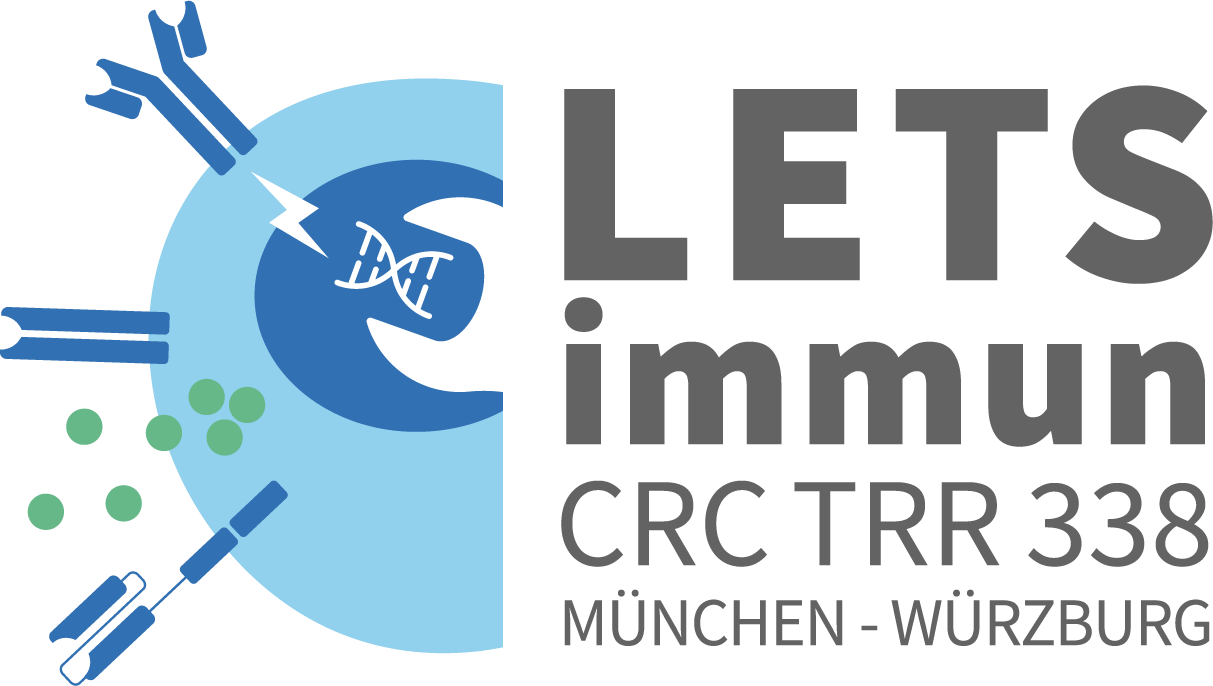Aims of the Project
The ambition of the scientists and clinicians engaged in this CRC/TRR LETSIMMUN is to establish immunotherapy
with genetically engineered lymphocytes as a safe and effective, scientifically advanced, broadly accessible treatment. This treatment should be available for all patients in need and can be applied for different clinical fields, including hematology/oncology, infectious and autoimmune diseases.
Following the CRC338 Vision ……. a brief outlook into the future
It is December 2030 and the lead scientist of the cell processing and production facility at the Technical
University of Munich is reviewing the list of cell products that will be released and transferred to the medical
center on that day. The first product on the list contains virus-specific T cells and are intended for a patient
with acute myeloid leukemia that had been successfully treated with FLT3-specific CAR-T cells and
subsequently received an hematopoietic stem cell transplantation to consolidate complete remission. As an
acute complication, the patient developed reactivation of cytomegalovirus (CMV) that had been dormant in
his body and flamed up in the phase of immunosuppression after transplantation. Conventional anti-viral
treatment had not been able to control the infection and therefore, his hematologist prescribed a CMVspecific cell product as part of the routine treatment algorithm at the medical center.
The CMV-specific T cells were generated out of the patient’s own blood by grafting a well defined CMV-specific T cell receptor into the genomic locus of the endogenous TCR, a maneuvre termed orthotopic TCR replacement that had refined and advanced for clinical translation as part of the research program in the CRC338 LETSImmun. The patient’s T cells adopted the CMV-specific TCR like their own, and were able to regulate expression and signal strength such that they retained their fitness until all virus had been controlled, and then enter the memory T cell pool. The lead scientist had been a PhD-candidate and graduated in the first term of the CRC and now oversees a team of 10 scientists and engineers that cater enigneered lymphocyte products for patients with malignant, infectious and autoimmune diseases at the two major university hospitals in Munich. The team is well connected and integrated with the cell production facilities at other German university hospitals. The first product to be released at the production facility at the University Hospital in Würzburg on that day comprises T cells with immunosuppressive properties for a patient with type-I diabetes. The T cells have been enginneered with an optimized chimeric antigen receptor (CAR) that recognizes a molecule in the microenvironment of pancreatic islet cells. In that specific microenvironment, the T cells exert a regulatory function and interfere with the destructive immune-reaction that destroys the islet cells. Following this intervention, the patient can reduce and subsequently seize the administration of insulin – a disliked daily routine that had been with the patient for over 20 years since his childhood. The genetically engineered lymphocyte product had been developed by the CRC, and subsequently been developed by a biotech spinout that is still part of the CRC innovation ecosystem and cell therapy cluster that was established around the CRC to foster the clinical translation and development of novel cell therapy products. Already in the second funding period of the CRC, the number of IND filings that emerged from the cell therapy cluster for academic investigator initiated trials with gene-engineered lymphocytes had doubled compared to the number in 2020.
Contact Details
Dr. Magdalena Nauerth
Trogerstr.30
81675 München
+4989 4140 6887
